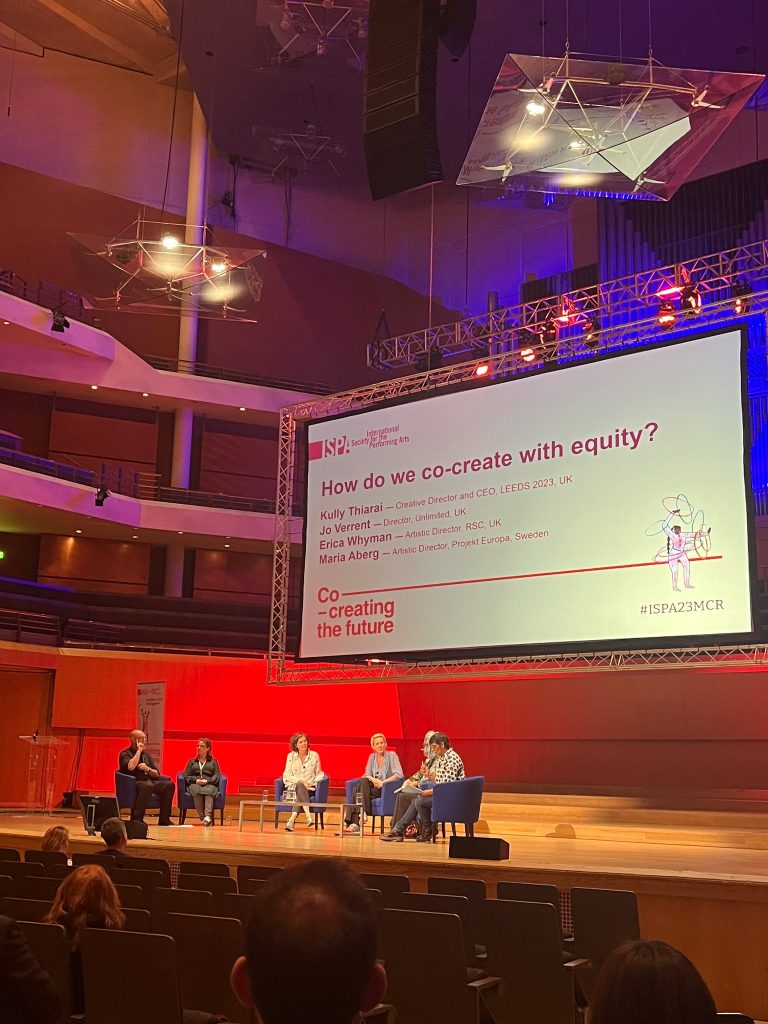
The International Society for the Performing Arts (ISPA) held their 2023 Congress in Manchester, led by the theme of Co-creating the Future. For the Creative Communities team, this was an exciting opportunity to dig into co-creation through the lens of performance art and learn from those in the sector what co-creation looks like to them, and the ways they hope it could help the sector ‘move forward with intention, relevance and resilience’ (ISPA, 2023).[i]
The day opened with a panel on Art and the Next Generations, highlighting the need for young voices to be included in decision-making, and discussing ways those in positions of power in arts organisation can make room and hold space for those otherwise excluded from the decisions that impact upon our shared futures.[ii] This included reflections on the way society values arts and culture as well as the greater need to embed arts and culture in curriculums, but little space was given to discuss informal, everyday creativity and how creative activities – and its potential for R&D and innovation – may be opened up to communities beyond the confines of formal education.
These themes were further explored by the second panel of the day, asking the question of How Can We Co-create with Equity? Grounded from the outset as a space to talk in practical, applied terms, speakers shared stories of success and failure in partnership working, and the complexities of instilling the equitable ethos of co-creation in their work. A theme that struck me during this conversation was the labour that is required for collaboration to be truly accessible and equitable for all, and the opportunity that is lost when programme funders and producers do not fully plan for the time and resources necessary to ensure co-creation is truly equitable. One practical example shared by a panellist included D/deaf, disabled and neurodivergent actors receiving invites to collaborate at very short notice, not allowing any space for the organisation and planning that may be needed for them to attend events, or to secure the support and resources necessary for them to comfortably participate. For collaborative, co-created work to be truly equitable, time and resources must be dedicated to it from the outset, not just as an afterthought.
The third and final panel tackled the Role of the State in the Arts, with the panellists’ reflections covering both national and international contexts before subverting the theme to ask what role the arts play in the state. Lizzie Crump from What Next? spoke of the difficulty of making and holding space for diverse voices in a fast-paced policy environment, something that What Next? seeks to challenge by bringing ‘unlikely alliances’ together to debate and shape arts and culture provision and policy, mirroring the model of Creative Communities.[iii]
Jo Verrent, director of Unlimited – an arts organisation dedicated to commissioning work from disabled artists – commented during a panel that much of Unlimited’s time is taken up by training and retraining of arts organisations in more equitable ways of working, with seemingly little change.[iv] Indeed, the keynote of the day from Ronee Penoi, director of artistic programming for ArtsEmerson,[v] called for much greater ambition alongside restorying, challenging our assumptions, and bringing in new practices in order to reimagine our future.[vi] While principles of equity, participation, and co-creation might be understood by the sector, and put in to practice by some, there are always more barriers or challenges that arise – or as a Haitian proverb shared by one panellist states, dèyè mòn, gen mòn, roughly translating to beyond mountains, more mountains.

This is a core aim of the Creative Communities programme: to not only further understanding about cross-sector co-creation, but to model how and where it can work for different collaborative partners, and what institutional changes are needed to make co-creation as a practice really thrive. That’s why I’m so excited for the launch of our Community Innovation Practitioners in September 2023. This network of 5 co-creation specialists with be capturing knowledge about co-creation in communities across the UK, sharing their experiences with each other and with wider networks of practice to generate knowledge that will go on to inform development of future practice and policy. There will always be more mountains, but if communities are properly equipped to tackle them, we might make that climb a little easier.
References:
[i] https://www.ispa.org/page/congress_mcr23
[ii] For great examples of AHRC projects making space for young people to share their voice, see the case studies featured in the Creative Communities deep-dive report. Examples include ‘Bordered Youth’, where young people living on the Ireland/Northern Ireland border will use film to document their experience and explore identities and relationships. By making space for young people to share their hopes and fears for their future, the project offers a platform for them to be included in political debate.
[iii] https://www.whatnextculture.co.uk/about/
[iv] https://www.weareunlimited.org.uk/
[v] https://www.artsemerson.org/
[vi] https://www.howlround.com/restorying-our-past-and-present-imagining-our-future
Brought to you by


